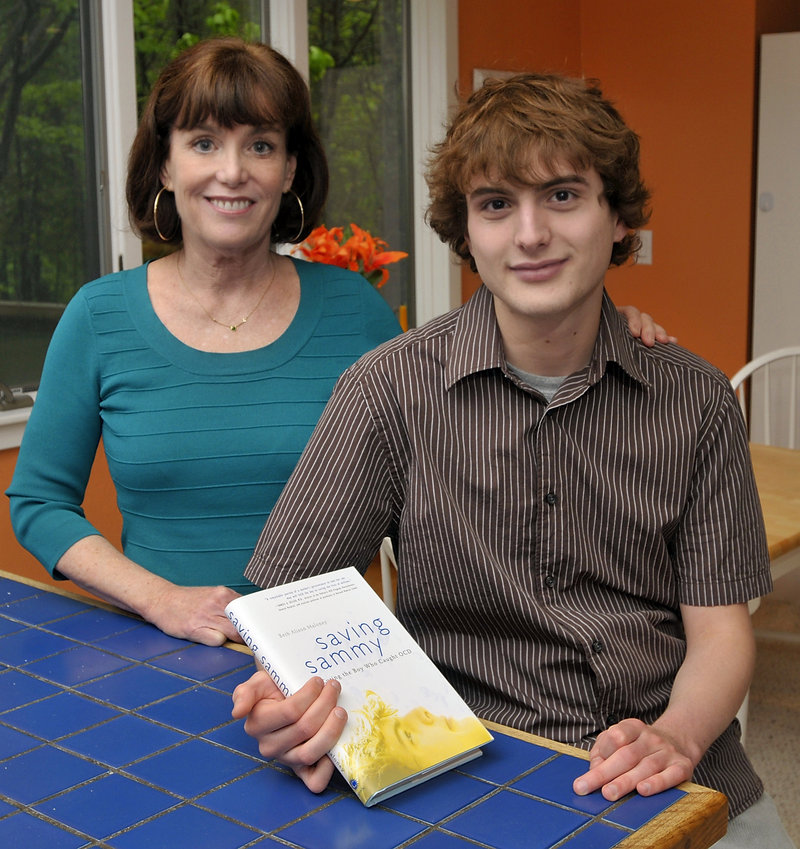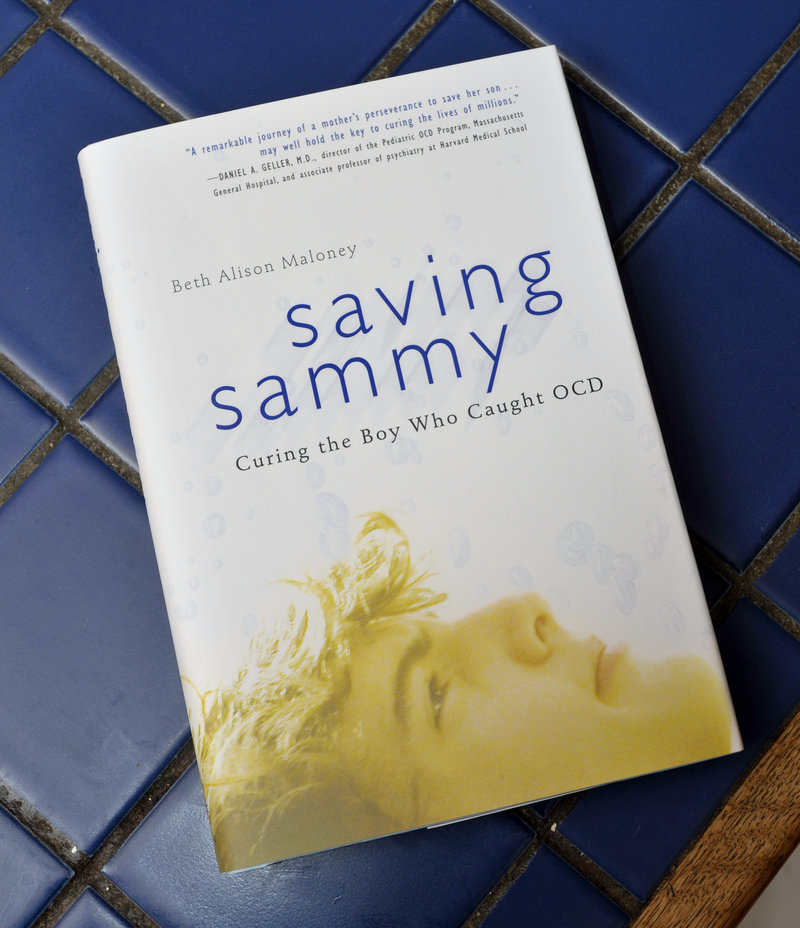KENNEBUNKPORT – One day, Beth Maloney was watching her son, Sammy, speaking to a crowd during the finals of a fifth-grade civics competition.
Weeks later, she could not get him to use the front door, walk across a carpet or sleep in his bed. Eventually, he would stay in his room and barely eat or bathe.
His doctors said stress had triggered an obsessive compulsive disorder, or OCD, and that Sammy would need extensive, and extended, care. But, as Maloney became nearly overwhelmed by the bizarre behaviors, she got advice that changed her life and, she believes, saved Sammy’s: Check to see if he has a strep infection.
Sammy is now an articulate 20-year-old student at Carnegie Mellon University. And his mother is an author whose book, “Saving Sammy: Curing the Boy Who Caught OCD,” is drawing popular attention to a controversial medical mystery.
“To think we had gone through all this and maybe he had a strep infection,” Maloney remembers thinking when she first learned of the link. “I made a promise to God that I’m not going to let this happen to other people.”
Sammy was one of a small but growing number of children to be diagnosed with pediatric autoimmune neuropsychiatric disorders associated with streptococcal infections, or PANDAS.
Many researchers, including those at the National Institutes of Health, believe natural antibodies produced by the body to fight an undiagnosed strep infection can attack the brain in some patients and trigger a sudden onset of behavioral disorders, such as OCD and Tourette’s syndrome. Some doctors, including those who treated Sammy, are giving the children simple antibiotics.
Why PANDAS occurs in some patients and not others is a mystery. Some neurological researchers argue there is not enough hard evidence yet to prove that PANDAS exists at all. Even among the many researchers and doctors who are convinced that the syndrome is real, there is still disagreement about whether antibiotic treatment, after a certain point, does any good.
Sammy is used to hearing surprise and disbelief about his story. At times, he just smiles and raises his hands as if to say, “Well, how do you explain this?”
In 2002, he was a normal, bright 12-year-old who liked exploring the beach and playing in the neighborhood with his two brothers.
Beth Maloney, a lawyer with her own practice, had recently finalized her divorce from the boys’ father and was moving the family into a new home. She first noticed something was wrong with Sammy when he was walking around with his eyes closed.
It was a compulsion, something Sammy’s brain was telling him he had to do. Embarrassed, he told his mother he was “memorizing.” Although he knew the behaviors were non-sensical, he said, “I couldn’t not do any of them.”
Soon, he started holding his breath, climbing over invisible walls, avoiding door handles, rugs, certain foods, the bathroom and anyone with bare feet.
Sammy’s doctors had attributed the onset of OCD to stress from all the changes in his life. He took standard medications and underwent therapy.
the end of the first year, Sammy had missed all of the sixth grade and also had developed tics, or vocal and physical twitches associated with Tourette’s syndrome.
Then a woman who heard the family’s story suggested a test for strep, the same infection that causes strep throats and scarlet fever. It was the first time Maloney had heard of PANDAS.
Although Sammy had not had a sore throat before the OCD started, a blood test found elevated levels of strep antibody. While some doctors urged Maloney against counting on an experimental treatment, she found doctors in Massachusetts and New Jersey who were treating PANDAS cases and put Sammy on an antibiotic, Augmentin.
“Within days (of starting the antibiotics), he came out of his room and played a board game with his brothers,” Maloney said. “It was remarkable.”
Sammy soon stopped having compulsions and tics. He also remained on other medications and in therapy, which he says helped him to gradually overcome the remnants of his compulsions.
After missing all of sixth and seventh grades, Sammy returned to school in Kennebunkport in 2004. He has been well ever since and stopped taking the antibiotics several years ago.
Maura Price, a pediatrician in Saco, said she has seen the same results multiple times in patients she has treated for PANDAS. One teenage girl from central Maine, for example, suffered with OCD for as long as 10 years and is now almost symptom-free after five months on antibiotic treatments, she said. “There are some kids who respond amazingly well,” she said.
On the other hand, some families call Price hoping to find a strep connection, and there is none.
“We’re not talking about every child (with OCD). We’re talking about a very specific subset of children who seem to develop this consequence of a strep infection,” she said. “I see nothing wrong with looking. I don’t think it’s wrong to think outside the box.”
Some doctors are less convinced about the diagnosis, and the treatment.
“Anecdotal data doesn’t really help from a scientific point of view,” said Stephen Rioux, director of pediatric neurology at the Barbara Bush Children’s Hospital at Maine Medical Center. “We operate in the evidence-based world as much as possible. That’s not to say PANDAS doesn’t exist. We need more epidemiological studies.”
Even if PANDAS does exist, antibiotic treatment doesn’t make sense because the drugs treat active infections; they do not reduce antibody levels that are blamed for causing the syndrome, he said.
“What would be not good is for everybody with a tic disorder or with OCD tendencies to think they are going to be cured by antibiotics,” he said. “I have had a few that reported they seem to get better with antibiotics and I’ve also seen children get better without antibiotics.”
While strep infections are routine, about 1 in 100 teenagers has OCD, and about 1 in 200 have tic disorders such as Tourette’s, according to the National Institutes of Health.
Susan Swedo, a senior researcher at the National Institutes of Health and one of the first to establish the strep link about 12 years ago, said most of those children probably do not have PANDAS. “Although we don’t know how often PANDAS occurs, it’s probably fairly rare.”
Swedo said she recommends that doctors do a strep test and monitor antibody counts in cases when behavioral symptoms come on suddenly and dramatically.
And she recommends treating any active strep infections with antibiotics.
Antibiotics do not reduce strep antibodies from past infections, she said. Researchers are studying whether the prolonged use of antibiotics helps PANDAS patients by preventing new strep infections, but there is not yet enough evidence to recommend the treatment, according to Swedo.
Maloney, meanwhile, is convinced there are a lot of people who may get better once their families learn about PANDAS.
She has heard stories like Sammy’s from around the country since the book was published in September, Maloney said. She also has heard from other families who have found new hope about treatment for their children.
“If you have a child with OCD or Tourette’s, definitely check out strep,” she said.
Maloney and her son appeared on the “Today” show in September, and on June 14 will be the subject of a Discovery Health Channel program called “Mystery Diagnosis.”
In July, Maloney will speak to the International OCD Foundation in Washington, D.C.
“There wasn’t really any kind of public profile (for PANDAS) before,” she said. “I’m very happy that we’ve managed to get it on the map.”
Staff Writer John Richardson can be contacted at 791-6324 or at: jrichardson@pressherald.com
Send questions/comments to the editors.




Success. Please wait for the page to reload. If the page does not reload within 5 seconds, please refresh the page.
Enter your email and password to access comments.
Hi, to comment on stories you must . This profile is in addition to your subscription and website login.
Already have a commenting profile? .
Invalid username/password.
Please check your email to confirm and complete your registration.
Only subscribers are eligible to post comments. Please subscribe or login first for digital access. Here’s why.
Use the form below to reset your password. When you've submitted your account email, we will send an email with a reset code.